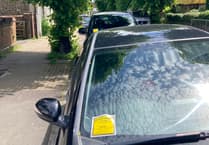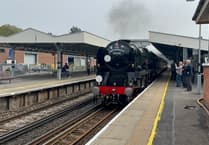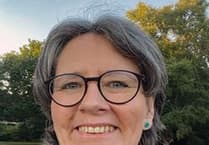A PETERSFIELD laundry is on the verge of saving a staggering 10 million gallons of water in just over two years - the equivalent of filling 30 Olympic-size swimming pools. The town has been hit with a hosepipe ban and restrictions on water use since March, following three dry winters. But revolutionary technology at Petersfield and Reliance Launderers and Cleaners in Rushes Road has already seen 9.7 million gallons of waste water saved from the sewers by re- treating and re-using it. Managing director Robert James said: "We went out on a limb by adopting this system, so we are very proud of what we have achieved.It is quite a considerable feat, but the system is still quietly working away on a daily basis. "Environmentally, we are just doing our part." The Clearwater system, the first of its kind in Europe, was installed in July 2004, when the company was looking for ways to reduce costs and minimise its impact on the environment. And now, after two successful years, and with the milestone figure in sight, staff are holding a £100 sweep stake to predict when the counter will tick over the 10 million mark. Mr James added: "At the time, it just seemed to be the right way to go. We had been unable to get a licence to pump water directly from an underground well. "We were looking for ways to deal with increased demand and the increased cost of water and energy rates, at the time. "I think all the staff are aware of the system we have in place and are proud of what we are doing. "The counter indicates that it should reach 10 million in about four weeks." The ceramic microfiltration system, which is supplied by Kemco and Dunlop Design Engineering Ltd, filters waste water from the laundry process and pumps treated water to a re-use tank, where it replaces mains supplies. As well as driving down costs, it has reduced CO2 emissions, use of fresh water, effluent volumes and demand on the boiler. "About 60 per cent of the water on site goes to the Clearwater system and of that, 80-95 per cent is recovered. That dramatically reduces the inflow of fresh mains water, and also significantly reduces the waste stream," said Mr James. "There is the added bonus of considerable heat recovery within the system, which has had a great impact on the laundry. The boiler now operates at medium to low fire or on standby, and the steam pressure across the laundry is far more stable. Therefore productivity has been increased. "Although it is not suitable for drinking, if you put a glass of tap water next to a glass of the treated water, you could not tell the difference." The origins of Petersfield and Reliance date back to 1899, when the Petersfield Laundry was incorporated into a limited company. It offered a domestic laundry service with delivery and collection over a wide area, using a horse and cart. In 1958, the Reliance Laundry (in Alton) bought the company and has traded ever since as Petersfield and Reliance Laundry. Today the laundry is one of the largest in Hampshire, employing 60 staff. • A spokesman for South East Water, the mains water supplier in Hampshire, praised the efforts by the company to use less water. She told The Herald: "The company and its customers have been working hard to use water wisely and we applaud the efforts made by Petersfield and Reliance to recycle the water at its premises. "Taking steps to avoid wasting water helps protect the environment and can also help companies save money, as their supply is measured and they pay for what they use. "The business is to be congratulated on its efforts to help the environment in which it works." Martyn Cole, environmental services manager at East Hampshire District Council, added his approval of the scheme. "Anything that helps save resources in the district is good news from our point of view. "Hats off to them for going to this effort to help save water. "Hopefully this is something that can be marketed to other businesses in the area."
Saving the environment in statistics The Clearwater system yields: • 86 per cent energy recovery from the waste water. • 86 per cent water recovery from the waste water at a temp of 50 degrees C. • 86 per cent reduction in salt used for softening. • 40 per cent reduction in chemical usage. • Waste-water quality suitable for all processes, including final rinses.



